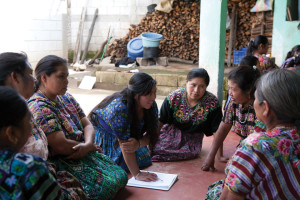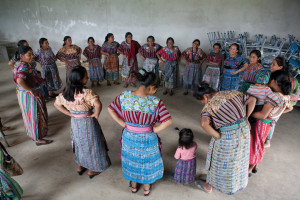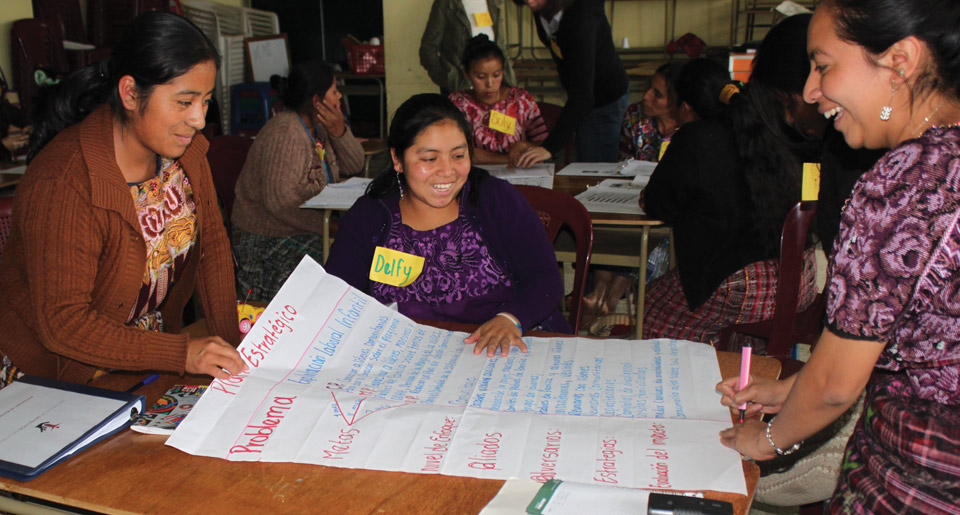Women’s Initiative for Justice
COMMUNITY SERVICE by Matt Bokor.
Thanks to the Women’s Justice Initiative (WJI), hundreds of rural, indigenous women in Guatemala are learning that they too have rights.
Elena, for example, is now one of only a few women in her community who has legal title to her land. Magda, who married at age 15 to escape abuse by both parents, is a leader and mentor. Lety benefits from her newfound strength and self-esteem. All have learned that violence against women is not normal behavior.
 “The vast majority of women participating in our programs have suffered from some form of violence—physical, psychological, sexual or economic,” said Kate Flatley, WJI’s founder and executive director. “It is difficult to provide exact statistics because gender-based violence is extremely underreported in the region where we work. Domestic violence is often viewed as acceptable and, as a result, many women do not identify themselves as victims of violence.”
“The vast majority of women participating in our programs have suffered from some form of violence—physical, psychological, sexual or economic,” said Kate Flatley, WJI’s founder and executive director. “It is difficult to provide exact statistics because gender-based violence is extremely underreported in the region where we work. Domestic violence is often viewed as acceptable and, as a result, many women do not identify themselves as victims of violence.”
Established in April 2011, WJI empowers Guatemalan women to address inequality and gender violence. Its three program areas are women’s rights education, legal services and community advocacy.
Flatley, a University of Virginia School of Law graduate, said she was motivated to help while studying health and human rights in rural Guatemala through a fellowship she received after law school graduation.
“As part of the study, our team of fieldworkers interviewed hundreds of Maya women. We found that the majority of the women we interviewed had little or no knowledge of their rights and had no access to legal services,” she explained. “Many women shared devastating accounts of abuse, discrimination and rape. I founded WJI to respond to these needs by providing women with rights education and access to legal resources.”
Over 600 women have participated in WJI’s programs; 200 currently attend the Women’s Rights Education Program, which meets with groups of 15-20 women in their communities once a week for six months.
The initiative targets Patzún (department of Chimaltenango) and 15 surrounding communities; over the next few years Flatley hopes to extend WJI’s reach into all 36 nearby towns. Roughly 60,000 people live in the area.
“WJI began its work in Patzún because of the lack of services and resources available to women in the region. Before WJI, there were no free legal services available for victims of violence and very few programs working directly with women to improve gender equality and prevent violence,” Flatley said.
Among the initiative’s many success stories is Elena, who attended the Women’s Rights Education Program. The workshops on property rights and inheritance caught her attention. She and her husband owned the land where they lived, and it had been in their family for generations, but they had no legal documents to prove ownership.
Elena and her husband began working with WJI’s lawyer, Viviana Patal. Using testimony and historic records, they were able to title their land. As is WJI’s policy, the land was titled in both Elena and her husband’s name, rather just in the man’s name, Flatley said.
“Elena is now one of only a few women in her community who owns land. This is a significant protection for Elena because if something were to happen to her husband in the future, his family members could not kick her off the land and claim ownership.”
WJI conducts its work in Kaqchikel, the local Mayan language, to ensure its programs are accessible to all community members. WJI works closely with community leaders to plan and implement its work. Usually, community leaders will organize a meeting of residents to explain WJI’s programs and encourage women to participate. Afterward, WJI staff visit women’s homes, often accompanied by community leaders, to invite them to participate.
“We have found that local leaders’ support for our work helps us successfully recruit new participants and significantly mitigates resistance from men,” Flatley said.
The initiative has six full-time paid staff members and a seventh part-time facilitator for the Women’s Rights Education Program. Integral to WJI are its 15 community advocates, who receive a monthly stipend for their work—often the first time they have earned a reliable income.
In addition to mayors and community development councils, WJI collaborates with a number of local organizations and government agencies, including the Oficina Municipal de la Mujer, the Juzgado de Paz and the Centro de AtenciónMaterna. Other collaborative partners include the Population Council’s Abriendo Oportunidades Program and the University of Virginia School of Law Human Rights Law Clinic. Funding is derived from individual donors and foundations.
To donate money, provide in-kind materials or volunteer, contact info@womens-justice.org. Visit womens-justice.org for more info.

Pingback: U.N. awards grant to Women’s Justice Initiative - Revue Magazine